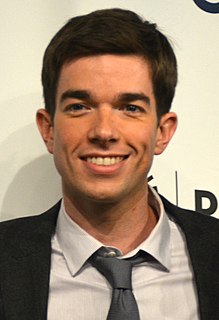A Quote by Jeremy Hardy
You can sometimes sneak a political joke in, which is sometimes the most effective place for a political joke - when it's not expected. It's just the most fun thing to do.
Related Quotes
Most of the time, the songs have jokes in them, little sarcastic things, or purposely kitsch or something. So that's going along with a story, like I do in life, just talking to myself and making fun of stuff and laughing at stuff that's serious. And sometimes it's a good idea to put the laughing into the songs. Sometimes it's not. Sometimes it's all right just to be serious. But most of the songs have some kind of joke in them.
Often, when you're in some of these writing rooms for... and the most restrictive is network television, right? They say, 'Wow, that's a great joke, but we can't do that. Okay, let's try the second joke. Oh, you can't do that one. But the third joke you can do,' and hopefully it will be great, but it will remind people of what the joke really was.
































